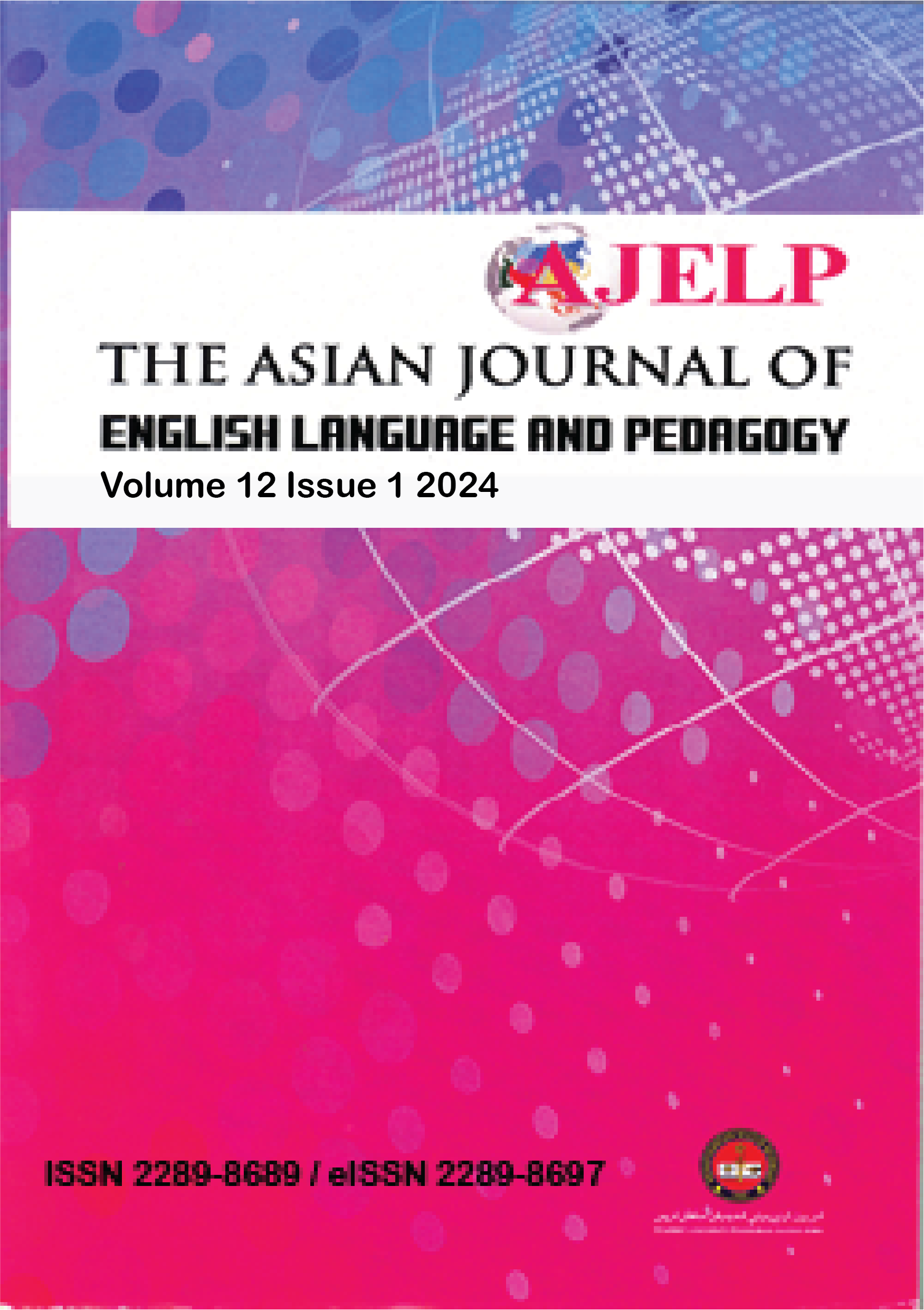A Critical discourse analysis on gender bias depicted from Indonesian ELT textbook for Junior High School
DOI:
https://doi.org/10.37134/ajelp.vol12.1.9.2024Keywords:
ELT textbook, textbook analysis, gender bias, critical discourse analysis, junior high schoolAbstract
This study explores gender bias in three English language textbooks for grades VII to IX, focusing on the representation of gender in images, figures, and character names. The analysis reveals that all three textbooks exhibit gender bias to varying degrees. In the grade VII textbook, males are more frequently depicted in images (55%) compared to females (45%), while females appear more frequently in character names (52%) than males (41%). The grade VIII textbook shows a slight male predominance in images (52% vs. 48% for females), but character names are balanced between the genders (50% each). In the grade IX textbook, females dominate the images (52% vs. 48% for males), while males are more prevalent in character names (59% vs. 41% for females). Gender bias is further explored using specific criteria proposed by Solomon (1988) and revealed imbalance proportion between male and female. From the results of critical discourse analysis, the invisibility criteria were found in 8 cases, gender stereotyping 4 cases, imbalance and selectivity 5 cases, while fragmentation and linguistic bias are absent across the textbooks. The criterion of unreality appears in 5 cases. These findings show that although some gender representations are balanced, bias still exists, emphasizing the need for fairer gender portrayals in educational materials.
Downloads
References
'Aini, W., Yanto, E S., & Fitriyana, W. (2021, October 5). Gender Representation in The English Textbook for Grade Ninth in Indonesia. Jurnal Pendidikan Bahasa, 8(2), 208-218. https://doi.org/10.36232/jurnalpendidikanbahasa.v8i2.1334
Al-Qatawneh, S., & Al-Rawashdeh, A. (2019). Gender representation in the Arabic language textbook for the ninth grade approved by the Ministry of Education for use in schools in the United Arab Emirates (UAE). Studies in Educational Evaluation, 60, 90–98. https://doi.org/10.1016/j.stueduc.2018.12.0.
Ansary, H. & Babaii, E. (2003). Subliminal Sexism in Current EFL/ESL Textbooks. Asian EFL Journal, 5(1)
Ariyanto, S. (2018). A portrait of gender bias in the prescribed Indonesian ELT textbook for junior high school students. Sexuality & culture, 22(4), 1054-1076.
Bahman & Rahimi. (2010). Gender representation in EFL materials: an analysis of English course books of Iranian high schools. Procedia Social and Behavioral Sciences, 9, 273–277
Bogdan, Robert C. Biklen Kopp Sari. (1982). Qualitative Research forEducation:An Introduction to Theory and Methods.Allyn and Bacon, Inc.:Boston London.
Clark, I. (2016). A Qualitative Analytic Case Study of Subliminal Gender Bias in Japanese ELTs. SAGE Open, 6(3). https://doi.org/10.1177/2158244016653437
Dahmardeh, M., & Kim, S., D. (2019). Gender Representation in Iranian English language Coursebooks. English Today,1- 11. https://doi.org/10.1017/S0266078419000117.
Emaliana, I., & Tusita, A. (2020, June 11). Exploring gender representation: patriarchal perspectives from EFL secondary school textbooks in Indonesia. Granthalayah, 7(11), 146-153. https://doi.org/10.29121/granthaalayah.v7.i11.2020.345
Fairclough, N. (1995). Critical discourse analysis: The critical study of language. Longman
Fauzi, K., Asih, Y. U., & Suhatmady, B. (2023). Gender representation in ELT textbook: English for tenth graders (content analysis). Jurnal Cahaya Mandalika, 4(2), 576-589.
Ian McGrath. (2002). Materials Evaluation and Design for Language Teaching.
Lestariyana, R. P. D., Widodo, H. P., & Sulistiyo, U. (2020). Female representation in government-mandated English Language textbooks used in Indonesian Junior High Schools. Sexuality & Culture, 24(4), 1150-1166.
Noor, P. (2024). An Analysis of Cultural in Selected English Textbooks for Junior High School. Intensive Journal, 7(1), 1-13.
Maxwell J. A. (1996). Qualitative Research Design: An Interactive Approach.
Prastowo, A. (2012). Panduan Kreatif Membuat Bahan Ajar Inovatif. Jogjakarta: DIVA Press.
Parham, F. (2013). Gender representation in children’s EFL textbooks. Theory and Practice in Language Studies, 3(9), 1674–1679. https://doi.org/10.4304/tpls.3.9.1674-1679
Ramadani, R F., & Novianti, M N R. (2021, July 1). Gender representations in Indonesian English language teaching (ELT) textbook titled “Bahasa Inggris untuk sma/ma/smk/mak kelas x”. ELTR, 5(2), 120-129. https://doi.org/10.37147/eltr.v5i2.121
Rong, J., Xue, G., Zhang, M., & Zhou, M. (2021, January 1). Gender Bias in the Curriculum: A Reflection from the English Textbook. https://doi.org/10.2991/assehr.k.210806.082
Sadker. (1982). Sex Equity Handbook for Schools.
Suhartono, S., & Kristina, D. (2018). Gender Bias in Textbooks and Test Items of English Language Learning in the Indonesian Context. 166(Prasasti), 425–428. https://doi.org/10.2991/prasasti-18.2018.78
Solomon Iryin D. (1988). Strategies for implementing a pluralistic curriculum in the social studies. The Social Studies. 79. 256-259.
Suwarno, Triyono, S., Ashadi, & Sahayu, W. (2021). Gender construction in the Indonesian government-distributed English textbook: Combining critical discourse analysis and corpus linguistics. Sexuality & Culture, 25(6), 2158-2175.
Zagreb. (2018). CULTURAL BIAS IN EFL TEXTBOOKS.
Zahra, R., Inawati, I., & Ariffin, K. (2024). Gender Representation in Indonesian ELT Textbooks: The Hidden Bias. EDUCATUM Journal of Social Sciences, 10(1), 37–49. https://doi.org/10.37134/ejoss.vol10.1.4.2024
Downloads
Published
Issue
Section
License
Copyright (c) 2024 Pajrian Noor, Lailatul Kodriyah, Alna Triskaya Angrum

This work is licensed under a Creative Commons Attribution-NonCommercial-ShareAlike 4.0 International License.





